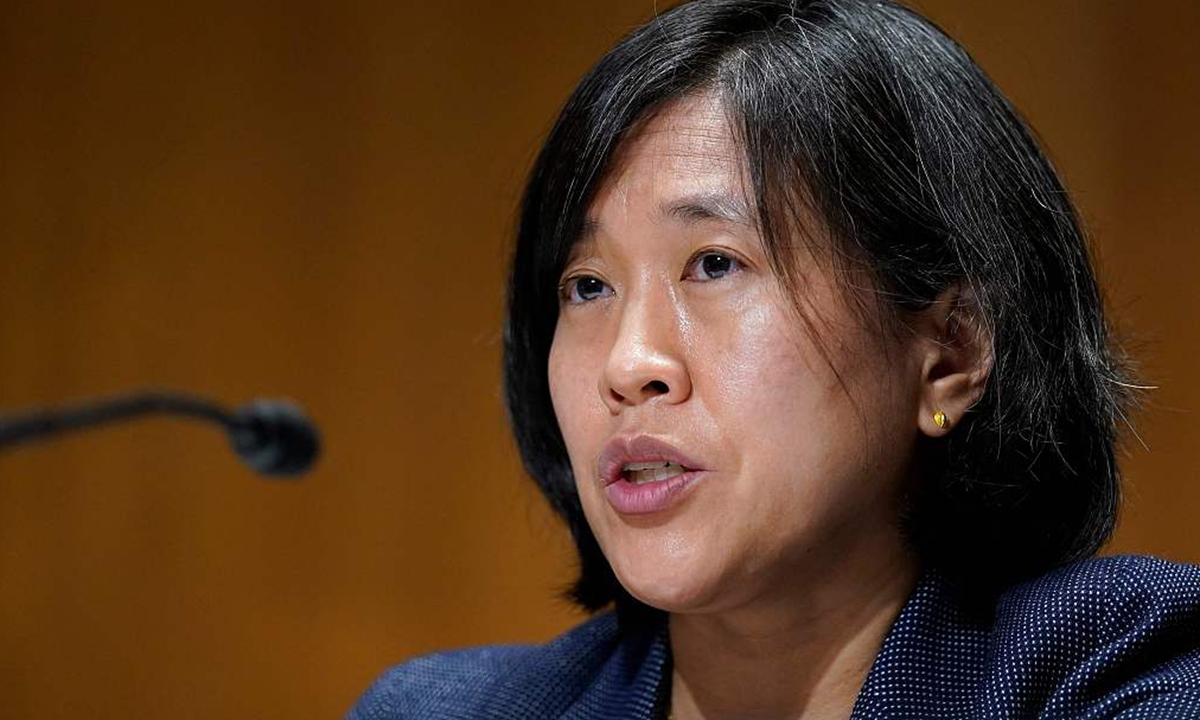
Katherine Tai Photo: VCG
The US will hold "frank conversations" with China on trade in the near future, US Trade Representative Katherine Tai said in a speech on Monday, which is a positive signal indicating the two nations’ upcoming trade talks could be more constructive, as economic frictions between the world’s two largest economies have undercut both in the past three years, experts said.
Katherine Tai delivered a speech to the US think tank, the Center for Strategic and International Studies (CSIS) in Washington, that she intended to have “frank conversations” with her Chinese counterparts, including talks over phase one trade agreement, noting that the upcoming talks are not intended to “inflame trade tensions with China.”
Tai also talked about "a targeted tariff exclusion process" for exemptions from customs tariffs imposed on $370 billion worth of Chinese goods a year by the previous Trump administration.
However, the Biden administration is unlikely to immediately lift tariffs on Chinese goods that were imposed by the previous Trump administration, although the tariffs are highly counterproductive and taking a toll on American consumers and manufacturers.
Tai said she is a “very practical” person, and the US will not seek an economic decoupling from China, and instead she will seek a “recoupling” that will bring more benefits to American businesses, including larger access to China’s huge market.
Tai’s remarks on Monday is widely considered to be the most detailed assessment of the Biden administration’s economic policy towards China, and is also her first detailed remarks on trade between China and the US since she took office in March.
The “frank conversation” from Tai is a positive signal, since China-US trade talk mechanism is always there, while the word “frank” may indicate the US realized it has to resolve bilateral trade frictions in a more pragmatic manner, Gao Lingyun, an expert at the Chinese Academy of Social Sciences in Beijing, also a close follower of China-US trade talk, told the Global Times on Monday.
This is also in line with China’s US strategy – China always says all differences should be resolved through candid talks, and maintaining normal trade between the world's two largest economies is very important for both and the global economy, analysts said.
Gao added that the US proposal for future trade talks showed the levies the US imposed on Chinese products no longer have the designed big impact – the US has neither found alternatives for Chinese products nor forced industrial chains moving out of China.
Imposing tariffs on bilateral trade will definitely harm US consumers and manufacturers, and won't help the Biden administration combat inflation, said an analyst.
“Any escalation of coercive trade measures from the Biden administration will cause heightened confrontation, and backfire on the US,” the analyst noted.
The Trump Administration imposed tariffs on nearly $370 billion in imports from China beginning in 2018. The Biden administration has yet to touch those tariffs.
When questioned about further talks related to the trade agreement, Gao said China has largely fulfilled its trade commitments.
Zhang Xiaoping, country director for China at the US Soybean Export Council (USSEC), told the Global Times in mid-September that Chinese companies "have newly ordered nearly a million tons of US soybeans."
Chinese industry analysts also predicted that given booming domestic demand, China may step up purchases of US soybeans and corn after September.
Moreover, if China could miss out on buying $200 billion extra goods in 2020 and 2021, the reason is the pandemic-caused inconveniences, which the US is also fully aware of, said the analyst.
“While in general, I would still hold a ‘cautious optimistic’ attitude toward future trade ties between the two countries, as there are a range of unresolved, complicated issues that’s far beyond trade,” Gao added.
China's total trade volume with the US fell 9 percent to 2.42 trillion yuan ($340 billion), while trade surplus expanded 7.7 percent to 1.33 trillion yuan from January to August this year.
The US was China's third largest trade partner in the first eight months, accounting for 12 percent of China's total foreign trade volume, according to the data released by the General Administration of Customs.
Global Times




